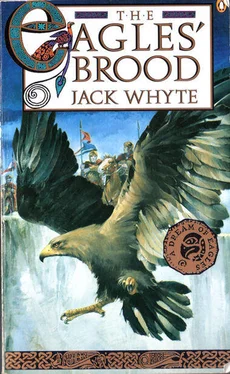Ullic and Uric made a new law among their people. No man could own a bow. Each was custodian of one for a time, charged with its welfare and responsible for its condition while it was in his charge, and all men were required to be trained in its use, just as all men were required to be constantly on the lookout for straight ash saplings from which arrows could be made.
By the end of the second year after the Raid, Uric had a hundred and four longbows and five hundred trained bowmen, but he still could take no significant part in our military affairs. He had to keep his bows close to home, where they were needed for training, since the short bows his men had used in the past were no longer adequate. Just as the change to long-swords had required us to change our training techniques, so had the change to the new longbow dictated new terms of training to Ullic's people. They were determined, however, to be ready for any emergency that might arise, so a chain of beacon towers, modelled upon the Roman watch towers, was set up to pass word quickly between our two communities.
In Camulod, Varrus and Equus kept their armourers at work constantly, forging the new long-swords for our mounted men and the old short-swords for the infantry, and once again apprentices were set to work turning out heavy shields for foot-soldiers. The whole of Camulod rang with the hammering of the armourers and the clashing sounds of drilling soldiers until people grew accustomed to the noise and oblivious to the constant clamour of military preparations.
Meanwhile, Uther and I grew older and stronger, and I combed my uncle's books in vain for the question that would entitle me to learn his great secret.
V
As those months grew into years there were times when I despaired of ever asking the correct question of my great- uncle. For three years I read and reread his notes and chronicles, and asked him every question that occurred to me. I learned a great deal about warfare and strategy and about history and the lessons of the past, and I learned even more about the character, wisdom and personality of my guardian. But I did not find the question that was the key to his greatest secret.
Then one day I noticed an inconsistency that had previously escaped me. In the beginning, it was no more than a niggling little doubt at the back of my mind, but its formless persistence annoyed me, and I worried at it for days before I went searching for the cause of it.
One cardinal rule governed Uther and me when we were in Uncle's Armoury: we were welcome there, but we were forbidden to touch any of the treasures he kept there and forbidden under pain of banishment to indulge our boyishness in any form of horseplay. The rest of Camulod was open to us for high fun. That room was for study only. Most of the time, we had no trouble conforming to this rule, since there was always an adult around, but on one frightening occasion, Uther tripped me, just for fun, while I was carrying a heavy book. I fell, naturally, but I fell against the small table that held Grandfather Caius's statue, the one that Uncle Varrus called the Lady. The table overturned and the statue hit the floor with an awful clang and clatter that appalled us both, since the great wooden doors to the Armoury stood open. Uther cursed and scrambled to set the table upright again, and I righted the statue, aware of its great weight—I had to really grunt to get it up high enough and Uther had to help me get it back onto the table—and aware also of the great gouge it had made in the polished wooden surface of Uncle Varrus's precious floor. It seemed as big and as deep as a ravine, that gouge. I knew it would be seen, and there was no way it could be hidden. I thought of moving the entire table over to cover it, but the mark was a full stride away from where the table normally stood, too far for any casual relocation to pass unnoticed. We left everything as it was. I replaced the book I had been carrying and we scampered out of there as quickly as we could, expecting to hear adult voices challenging us at every step.
As it turned out, no one had heard the noise, and as the day passed, no one seemed to notice the mark on the floor. After our initial fright, we giggled together about the event, dramatizing our shock and the risk of Uncle's displeasure that we had incurred. Only that night, before I fell asleep, did I become aware of a tiny uncertainty, an anomaly, an infuriating, unidentifiable inconsistency in the back of my mind.
I was a pragmatic boy with an enquiring, logical mind. I did not like mysteries and I could not tolerate unresolved mysteries, so the next day I went over the entire scene in my mind, time and time again, just as it had happened. I had been carrying the book, Uther had tripped me, I had fallen against the table, then Uther righted the table, I wrestled the statue upright and together we lifted it and put it back in its place on the table. Then I had noticed the hole in the floor and panicked because it was so obvious. I had picked up the book, which had fallen open but was luckily undamaged, and replaced it where I had found it, and then we had both fled the room. So what was wrong? Why this uncertainty? The only thing that came to me, eventually, was the terrifying thought that the book had been damaged in falling and that I had not really taken note of the extent of the damage, dismissing it as insignificant beside the damage done to the floor. The more I thought about it, the more chilling the thought became. I knew how highly Uncle Varrus prized his books. To Uther they were unimportant, but I knew better. In truth, it was the gouge in the floor that was insignificant. If Uncle Varrus discovered that I had ruined, or even marred, one of his precious books because of a foolish boy's irreverence, he might bar me forever from using them.
Filled with anger at Uther for his thoughtless stupidity and lack of respect, I ran from my own room to the Armoury. As I approached it, my uncle came striding out, his face white and pinched and angry looking, followed by an equally white-faced servant. I skidded to a halt as he came sweeping towards me and hung my head in shame to receive his wrath, but he ignored me, hurrying past as though I was not there. Hardly daring to believe my good fortune, I went into the empty Armoury and straight to the table that held the precious books. They were all still there, including the one I was looking for. It was one of Grandfather Caius's books and I remembered thinking that day that I had not dipped into it in years, although I knew the entire text almost by rote. I reached for it and examined it minutely. It was absolutely unmarred; not a mark or a blemish anywhere.
Conscious of a feeling of great relief that I had been wrong and that nothing was amiss, I pulled over a stool, made myself comfortable, and opened the book at random, folding the heavy parchment sheets over the bindings that held them in place, and began to read of Grandfather's doubts about the skystones and how they could have fallen from the sky in flames. And then my memory gave a leap and I closed the book with a bang and searched among the others until I found what I was looking for, and there were the words, written as I remembered them in Grandfather's broad script:
"...I reached to pick her up. 'Careful, Caius! She's heavier than you think,' warned Publius. 'Here, let me help you.'
"Between the two of us we picked her up and carried her, with some difficulty, across the yard into the house and placed her in my day-worn on a table by the window..."
There was the source of my mystery, the anomaly that had been plaguing me! I had no recollection of my grandfather, but Uncle Varrus was massively strong, and yet it had taken their combined strength to carry the statue "with some difficulty" from the forge to the house. But Uther and I had picked it up from the floor, although admittedly not easily, and replaced it on the table. I knew I could carry it alone for some distance, given a strong first grip on it, and I had not the slightest doubt that Uther and I together could carry it as far as we wanted to. But Uther and I were three months short of twelve years old. Uncle Varrus and my grandfather had been grown men, big men, strong men, at the time my grandfather had been writing of. Even today, old as he was, Uncle Varrus had more strength than both Uther and me combined.
Читать дальше









